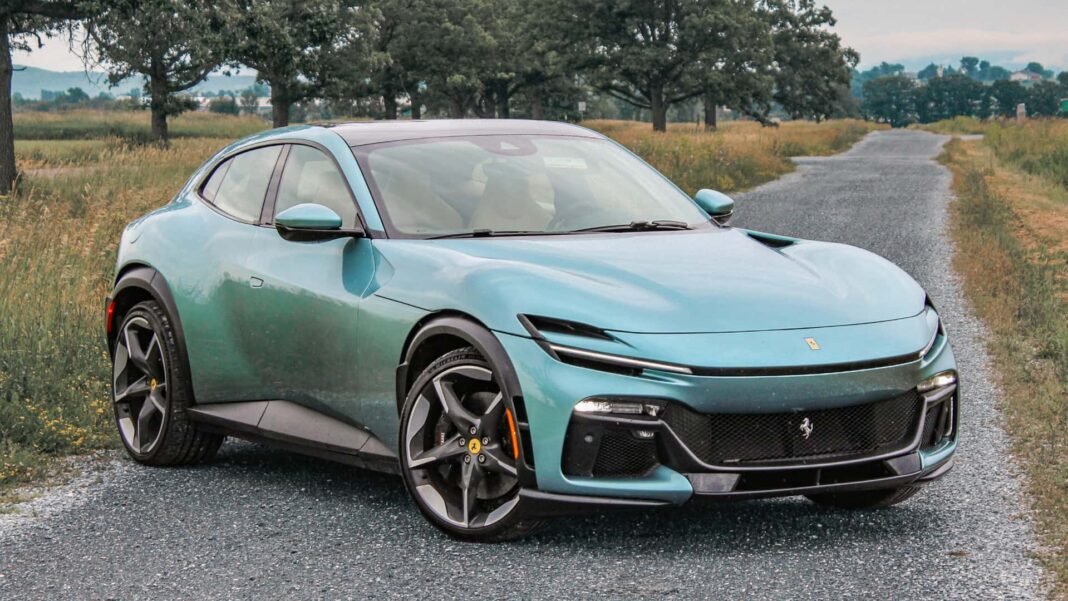Impact of President Trump’s 25% Tariff on Imported Cars: Ferrari’s Strategic Response
President Trump’s recent announcement of a 25% tariff on imported cars is shaking the automotive landscape, leading luxury automaker Ferrari to implement price changes while ensuring its clientele maintains access to current pricing on select models until early April.
In a bold move that has reverberated through the automotive industry, President Trump has revealed a 25% tariff on all imported cars, effective April 3, 2024. This tax, aimed at reshaping the automotive market, significantly impacts brands based in foreign countries, particularly those without manufacturing plants in the U.S. Among the hardest hit will be Italian luxury auto manufacturer Ferrari, which sources all of its vehicles from Italy. The company has announced plans to raise the prices of many models to offset the impending costs while suggesting that its wealthy consumer base may still remain largely unfazed by the price hikes.
Who and What is Affected by the Tariff?
The new tariff primarily targets foreign car manufacturers bringing vehicles into the United States. Although many brands are facing challenges due to the tariff, Ferrari stands out due to its complete reliance on Italian manufacturing. The effects are structured as follows:
– **Effective Date:** April 3, 2024.
– **Affected Brands:** Foreign manufacturers relying on imported vehicles, particularly European brands.
– **Ferrari’s Response:** The price hike of up to 10% on various models.
Ferrari’s Pricing Adjustments
To manage the financial burden imposed by this tariff, Ferrari will raise prices by an average of 10%. However, they have decided to absorb some of this cost on models such as:
– **296**
– **SF90**
– **Roma**
Conversely, potential customers seeking models like the Purosangue, 12Cilindri, and F80 should anticipate increased prices.
How Can Customers Avoid Price Hikes?
Ferrari is offering a temporary solution for customers hoping to avoid the impending price increases:
– **Both Prepaid Orders:** Customers who place orders for any model before April 2, 2024, can lock in existing prices, preventing the impending tariff from affecting their sale.
– **Dealer Coordination:** The company will collaborate with its U.S. dealer network to finalize price adjustments post-tariff implementation.
Will Enthusiasts Care About the Price Increase?
Given Ferrari’s target demographic—affluent buyers—it is likely that the wealthy clientele may not be significantly deterred by the price adjustments. Sales trends in 2024 suggest a robust interest, with Ferrari reporting:
– **Global Deliveries:** 13,752 units in 2024.
– **U.S. Market Sales:** 3,452 units, accounting for approximately 25.1% of total sales.
– **Current Orders:** Sufficient to cover production capacity through 2026, suggesting sustained demand even amid the price increase.
Looking Ahead: Ferrari’s Future Models
While the tariff will affect certain models, Ferrari has confirmed a thrilling lineup for the future:
– **New Models:** At least six new models, including the company’s first-ever electric vehicle (EV), are set to debut within the next year.
– **Production Facilities:** These new models will be produced at a newly established plant in Maranello, which presents exciting opportunities for Ferrari’s evolution in the automotive market.
– **Replacement Models:** Expected successors for the 296, SF90, and Roma by the end of 2025.
Current Model Phasing Out
At the same time, Ferrari is making strategic decisions about its existing models:
– **Phased Out Models:** The SF90 Stradale and Roma have officially been discontinued.
– **Continuing Deliveries:** The Roma Spider and SF90 Spider will still be delivered through 2025, alongside the SF90 XX Stradale and SF90 XX Spider.
Moreover, exclusive customers await delivery of their Daytona SP3 from Ferrari’s highly coveted “Icona” series. This limited-run offering continues to strengthen Ferrari’s desirability among collectors and aficionados.
Conclusion: A Test for the Luxury Automotive Market
The 25% tariff on imported cars represents a significant shift in the automotive market, particularly for luxury brands such as Ferrari that depend on overseas manufacturing. While price increases may concern some consumers, data suggests that Ferrari continues to thrive, even amid financial adjustments. As the automaker gears up for its extensive lineup of new models and addresses current market challenges, its resilience is put to the test, marking a pivotal moment in the intersection of luxury automotive manufacturing and governmental policy.
Keywords: President Trump, 25% tariff, imported cars, Ferrari price increase, luxury automotive industry, U.S. market, electric vehicles, automotive tariffs
Hashtags: #Ferrari #AutomotiveNews #CarTariffs #LuxuryCars #ElectricVehicles #PresidentTrump



